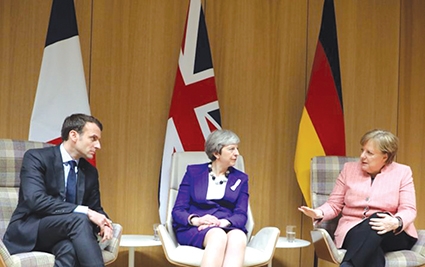What Next in Iran?
Op-Ed
On May 8, US President Donald Trump made the decision to pull the US out of the Iran nuclear deal (JCPOA). This was done despite all efforts of European leaders to convince Trump to stay in. The President of France and German Chancellor Merkel visited Washington late April and UK Foreign Secretary Johnson was in DC on May 6-7. However, all failed to reach an agreement with the US President. President Trump’s decision means the restoration of the US nuclear related Iran sanctions, including the ones on the Central Bank of Iran that are part of Section 1245 of the FY2012 National Defense Authorization Act. This renewal of US sanctions will potentially have an immediate impact on all countries purchasing oil from Iran, and particularly on countries with financial institutions that have transactions with Iranian banks, since they will be cut off from doing business with the American economy.
Immediately after President Trump’s decision, UK Prime Minister Teresa May, German Chancellor Angela Merkel and France President Emmanuel Macron made a joint statement in which they emphasized that the nuclear agreement remained important for their shared security and urged all sides to remain committed to its full implementation. The three leaders said they would remain parties to the JCPOA. They then called on the US to ensure that the structures of the JCPOA could remain intact, and to avoid taking action which may obstruct its full implementation by all other parties to the deal.
In a televized address, Iranian President Rouhani called President Trump’s decision to pull the US out of the Iranian nuclear deal illegal and illegitimate and a “violation of international agreements.” He went on to emphasize that Iran had always complied with the nuclear deal and was going to stay in the accord despite the US pullout.
The Iranian Foreign Ministry was instructed to hold talks on the nuclear deal with the EU, Russia and China within the next few weeks. Leader of the Islamic Revolution, Ayatollah Khamenei, during his visit to the Farhangian University on May 9, stated that Iran did not trust the three European countries which are part of the deal and without receiving a strong guarantee from them, Iran was not going to stick to the nuclear agreement.
President Trump’s decision will further complicate the geopolitical situation around Iran. In recent months, the region has been facing the growing Iran-Israel rivalry in Syria. Just hours after President Trump’s May 8 decision, Israeli military jets attacked an Iranian base near Damascus. According to Israeli sources, Iran was going to launch missiles targeting Israel from that base in retaliation to the Israeli attack against the T4 Iranian base near Syrian Homs carried out on April 9.
Meanwhile, the May 6 Parliamentary elections in Lebanon, the first since 2009, strengthened the Hezbollah positions in the country, potentially making a new Israel-Hezbollah war more likely. Israeli authorities have made multiple statements that they will not tolerate a permanent Iranian military presence in Syria and will not allow use of Syrian territory as a launch pad for producing and delivering modern weaponry, and especially precision missiles, to Lebanon.
Israel is actively engaged with Russia in trying to thwart the delivery of modern air defense systems to Syria and use the Russia-Iran partnership in Syria to curb Iranian influence through Russian support. The Israeli Prime Minister recent statement revealing tons of Iranian secret documents, allegedly proving Iran’s breach of the nuclear deal, definitely played a role in tilting President Trump towards pulling the US out of the deal.
The US decision will put additional pressure on the Iranian economy, which is already in a turbulent phase with continuing depreciation of the Iranian currency and growing unemployment. The December 2017-January 2018 mass demonstrations in different Iranian cities proved the growing discontent among the Iranian population. However, it may take years if not decades to see the worsening economy create the necessary conditions for fundamental changes to be made in the Iranian foreign policy. Meanwhile, the President Trump’s decision makes any further US-Iran negotiations on issues relating to the future of Iran’s ballistic missile program or Iran’s regional activities less likely to happen. It will also strengthen the positions of foreign policy hardliners in Iran who argue that any negotiations with the US are senseless, as Washington can’t be trusted.
In the short-term perspective, both Iran and other members of the nuclear deal will continue to adhere to the 2015 agreement, but the unilateral US decision paves way for Iran to more actively pursue its ballistic missile program as well as strengthen its involvement in Syria, Iraq, Yemen and Lebanon. Tehran will likely seek to deepen its cooperation with Turkey and Russia, creating necessary leverage in its relations with the US and Israel. Thus, President Trump’s decision will not prevent Iran form continuing on its current foreign policy course and will bring the Iran-Israel military conflict, with the potential involvement of Saudi Arabia, closer. In such a scenario, Syria and Lebanon may well be transformed into an Israel-Iran-Saudi Arabia conflict hotspot, which will only prolong the sufferings of the Syrian people with no clear path to victory for either side.
By Benyamin Poghosyan












